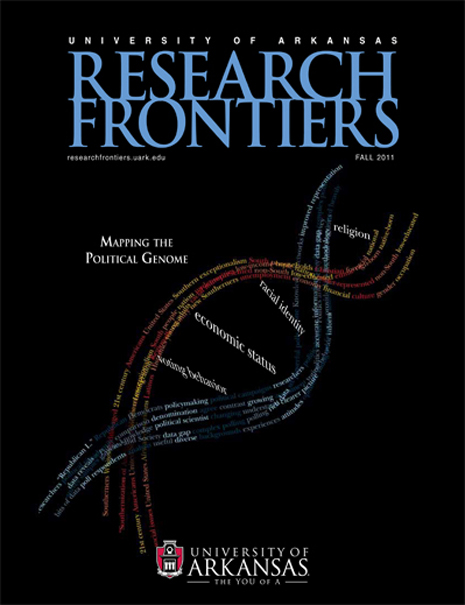
FAYETTEVILLE, Ark. – You can now interact with others interested in research on campus through social media. University of Arkansas Research Frontiers magazine has both a Facebook and a Twitter presence to help keep people informed about research on campus.
“The social media sites will present an opportunity to engage and inform people year-round about the rich culture of research on campus,” said Melissa Lutz Blouin, senior director of academic communications.
See the University of Arkansas Research Facebook page or the UArkResearch Twitter Feed for up-to-the-minute news about research at the University of Arkansas.
As information is made more available through social media sites, the Research Frontiers team has jumped at the opportunity to use the emerging outlets to share university research with people all over the world.
The fall research videos include a feature on the Division of Agriculture’s plant detectives in the Plant Health Clinic, which determines the causes and diseases of dead plant specimen sent to the group; a student’s project to put food waste to good use; a cooking session in nanoscience; and interviews with four researchers from the Blair-Rockefeller Poll team.
The four main feature articles in the fall issue range from the political genome of America to keeping shelves stocked at stores, from two assistant professors’ work helping students learn to write to a university physicist who studies the internal workings of the universe.
Todd Shields, Pearl Ford Dowe, Angie Maxwell and Rafael Jimeno, members of the Blair Center of Southern Politics and Society, created a polling instrument designed map the country’s political genome, and get data to fill in the void of information about the decisions voters make in the South. They note that the South can no longer be viewed as a homogeneous region, and that the data gaps must be filled to understand the complex politics of the region.
Sam M. Walton College of Business professors Matt Waller and Brent Williams study supply-chain management practices to help stores and suppliers more accurately predict the needs and buying habits of consumers. They found that when point-of-sale data was available to suppliers, prediction accuracy increased and forecasting errors decreased.
When it comes to teaching, getting students excited about reading and writing can be a challenge. Sean Conners and Chris Goering, assistant professors in secondary education, explore new ways to increase students’ reading and writing skills. Conners uses multimodal texts, those with visual elements, while Goering uses music lyrics to help the students stay motivated and write about their lives.
For Jak Chakhalian, life is about understanding the very mechanisms that enable the universe to work. Studying superconductive materials and the relationships between those materials, he pushes the boundaries of knowledge by creating new materials and discovers new things about the parent materials that could not have been learned otherwise.
The magazine also includes a feature on English professor and poet Michael Heffernan and a story about a recent Honors College graduate whose project focused on improving conditions for people with visual impairments. The UA Q&A section answers questions about cloud computing and how the government decides whether or not to change interest rates.
Topics
Contacts
Will Bryan, intern
University Relations
479-575-5555,
Melissa Blouin, director of science and research communication
University Relations
479-575-3033,